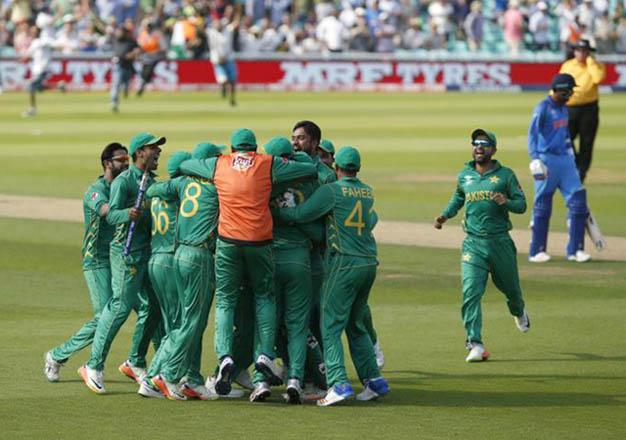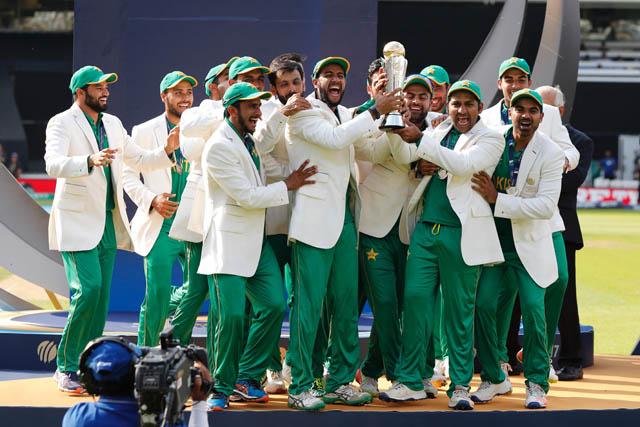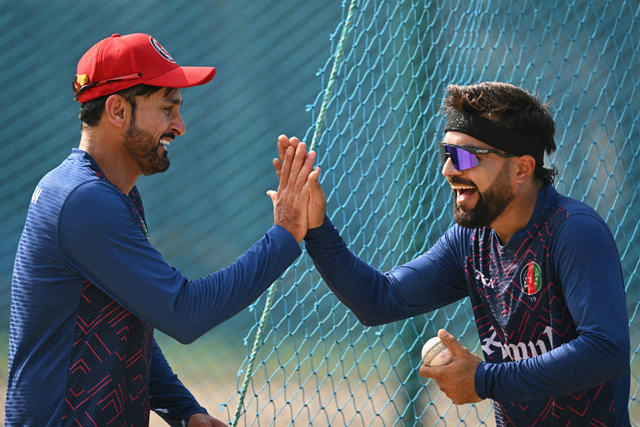You are here
Triumphant Pakistan have core to target further glory
By Reuters - Jun 19,2017 - Last updated at Jun 19,2017

Pakistan’s Sarfraz Ahmed and teammates celebrate winning the ICC Champions Trophy against India in London on Sunday (Reuters photo by Paul Childs)
Pakistan’s Champions Trophy success not only defied the odds, but also suggested the mercurial side have found the nucleus of a squad capable of returning to England in 2019 confident of claiming a second 50-over World Cup title.
The South Asians arrived in Britain for the eight-team, One-Day International (ODI) tournament as the lowest-ranked side, packed with players still trying to find their feet at the highest level and given little hope of emerging victorious.
Their confidence was dented when they suffered a thumping loss to arch-rivals and neighbours India in their opening match of the campaign and the limp performance put Pakistan’s chances of reaching the semifinals in severe jeopardy.
However, they quickly silenced their critics by defeating top-ranked South Africa and Sri Lanka to reach the last four, where they stunned previously unbeaten hosts England before outclassing defending champions India in Sunday’s final.
“Great team effort! After losing the first game, we were nowhere,” all-rounder Mohammad Hafeez told the official broadcasters after the team’s 180-run win over India.
“We were in the knockout stage but no one gave us a chance. The way we showed character, this is for the nation. They have been waiting for this for a long, long time. This is the least we could do.”
The most recent global success for Pakistan in one-day cricket before Sunday was the 1992 World Cup win in Australia and New Zealand, when another unfancied side, led by talismanic all-rounder Imran Khan, beat England in the final in Melbourne.
Since the departure of captains Misbah-ul-Haq and Younis Khan from the 50-over format in 2015, Pakistan slumped to ninth in ODI rankings and barely managed to qualify for the Champions Trophy, contested by the top eight sides in the rankings.
The decline cost Azhar Ali the captaincy and Sarfraz Ahmed, the Twenty20 skipper, was elevated to the role in February.
With their inability to host top international sides on home soil due to security concerns and a spot-fixing controversy blighting their domestic T20 league, Sunday’s win provided the country’s cricket fans with some much-needed cheer.
The victory was made even more remarkable when recent form is taken into consideration as Pakistan had also lost their last seven matches against India in ICC events before the final.
Dangerous attack
“After the [first] India match, one thing I said to my boys was ‘the tournament hasn’t finished yet’,” Sarfraz told reporters. “It’s a very young team and credit goes to them and the management.
“It’s a very important boost for us to win this. When we arrived here, we just played like we have nothing to lose. Credit goes to my batsmen, my bowlers and the team management.
“I think it’s a very proud moment for me, my team and my country.”
The Champions Trophy success will also boost Pakistan’s hopes for a second World Cup title when they return to England and Wales in 2019.
The country has a tradition of producing exciting fast bowling talent and 25-year-old Mohammad Amir and Junaid Khan, 27, can be expected to spearhead the pace attack at the next World Cup.
Add deadly accurate medium paceman Hasan Ali, the player of the Champions Trophy, and 18-year-old leg-spinner Shadab Ali to the mix, and Pakistan have a bowling unit with enough menace to trouble any side in the world.
With Babar Azam and Fakhar Zaman also coming of age, Pakistan’s batting lineup appears to have the right blend of youth and experience, boosted by the solidity of former captains Azhar, Hafeez and Shoaib Malik.
“We want to be a little more consistent as a team,” coach Mickey Arthur said.
“We’ve got a group of young players who are fantastic. We have to keep this momentum going. We’re happy with the brand of cricket we’re playing.
“We’ve got two years until the 2019 World Cup. We’ve got the monkey off our back in terms of qualifying. We now have two years to identify a squad we want to take forward and give them enough game time. That’s the aim at the moment.”
Related Articles
LONDON — Fakhar Zaman and Mohammad Amir shone as Pakistan defied the odds to overwhelm arch-rivals India by 180 runs and pull off a major up
LONDON — Chris Jordan has said it will be no surprise to him if England teammate Jason Roy emerges from a run-drought with a match-winning i
CHENNAI, India — Afghanistan skipper Hashmatullah Shahidi on Tuesday hailed flamboyant shot-maker Rahmanullah Gurbaz as a World Cup “matchwi

















